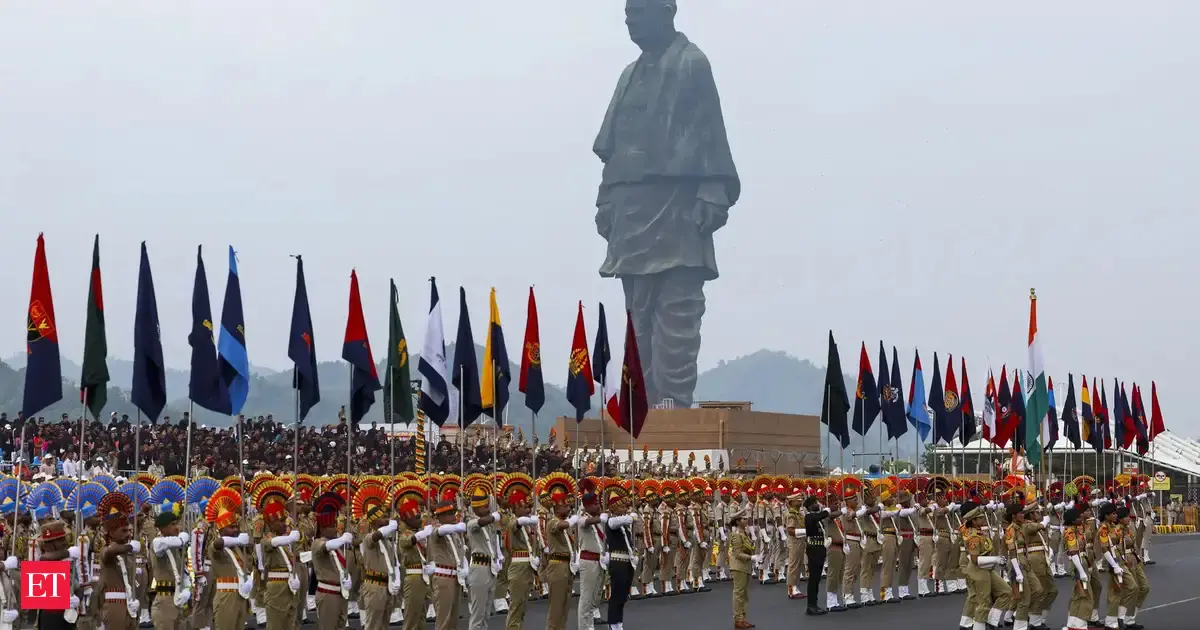Copyright indiatimes

PTIIndo-Tibetan Border Police (ITBP) personnel perform a display during the National Unity Day event marking the 150th birth anniversary of the country's first Home Minister, Sardar Vallabhbhai Patel, at the Statue of Unity, in Narmada district of Gujarat. Sardar Vallabhbhai Patel’s name is etched not just in the annals of India’s freedom struggle but also in the very foundations of the Indian nation-state. Known as the Iron Man of India, Patel was a rare combination of a visionary statesman and a pragmatic administrator. His leadership not only united a divided land but also gave shape to the democratic and institutional framework that sustains India to this day.Forging Unity: The Great Integration of 1947In the chaotic aftermath of Partition, when newly independent India faced the daunting task of merging 565 princely states into one union, Patel emerged as the linchpin of national unity. As Deputy Prime Minister and Home Minister, he deftly balanced persuasion with firmness to achieve what many considered impossible.While most rulers voluntarily signed the Instrument of Accession, a few, including the Nizam of Hyderabad, resisted. Patel responded with Operation Polo — a swift military action that forced Hyderabad’s integration into the Indian Union. His approach — diplomacy backed by decisive force — averted prolonged bloodshed and ensured that the subcontinent’s map took the shape we recognise today.Live EventsIn a country reeling from the violence of Partition, Patel’s measured strength provided stability and a sense of nationhood. It was this indomitable resolve that earned him the title “Iron Man of India.”Building the Backbone: Civil Services for a New NationWhile freedom had been won, governing a diverse and newly independent India required an efficient administrative structure. Patel recognised that without a strong, impartial bureaucracy, the nation could easily descend into chaos.As early as 1946, he began laying the groundwork for a merit-based, pan-Indian civil service. Despite resistance from several political quarters — who viewed the legacy of the British-era Indian Civil Service with suspicion — Patel stood firm. He transformed the colonial “steel frame” into a national one by creating the Indian Administrative Service (IAS) and the Indian Police Service (IPS).To the first batch of officers, Patel famously said, “You will not have a united India if you do not have a good All-India Service which has the independence to speak its mind.” His emphasis on integrity, humility, and service to the people continues to define the ethos of India’s bureaucracy.Counting a Nation: The Vision Behind India’s First CensusJust months before his death, Patel once again demonstrated his administrative foresight. In February 1950, he inaugurated a conference of census superintendents, setting the tone for India’s first national census. He envisioned the exercise not merely as a headcount but as a tool for planning — a means to understand the country’s economic, social, and demographic landscape.Patel underscored that the census would gather “valuable scientific data of sociological importance”, including livelihood patterns and economic activities. His statement that the census was an opportunity for the government “to reach every home throughout the length and breadth of the country” captured its democratic spirit.The 1951 Census — India’s first after Independence — became a cornerstone of policy planning, embodying Patel’s belief in governance built on data and inclusivity.The People’s Leader: From Bardoli to the NationBefore he became India’s unifier, Patel had already proven his mettle as a leader of the masses. His leadership during the Bardoli Satyagraha of 1928 — a farmers’ protest against unjust land tax hikes — demonstrated his strategic brilliance and empathy for the poor.Through disciplined non-violent resistance and clear negotiation, Patel forced the British authorities to roll back the tax increase. It was after this victory that the peasants affectionately conferred upon him the title “Sardar”, meaning leader.Earlier, during the Kheda Satyagraha of 1918, Patel had worked closely with Mahatma Gandhi to secure tax relief for farmers hit by famine — a glimpse of the firm yet compassionate leadership that would later guide a nation.A Strong Nation Needs a Strong ArmyPatel’s realism extended to matters of national security. On January 17, 1948, addressing a massive gathering at Mumbai’s Chowpatty, he declared that India’s survival as a sovereign nation depended on the strength of its armed forces.While Gandhi advocated non-violence even in defence, Patel maintained that “our army ought to be strong enough that no power would ever think of interfering in India.” His foresight laid the foundation for a robust defence policy — one that recognised peace as a product of strength, not weakness.The Iron LegacySardar Vallabhbhai Patel’s contributions transcend mere political achievement; they represent the architecture of a functioning democracy. From uniting a fragmented land to establishing institutions that anchor India’s governance, his imprint endures in every sphere of national life.He was not just the unifier of India — he was its architect, planner, and guardian. In Patel’s legacy lies a timeless lesson: that nation-building demands both vision and resolve — steel in spirit, yet rooted in service.(With TOI inputs)Add as a Reliable and Trusted News Source Add Now! (You can now subscribe to our Economic Times WhatsApp channel) Read More News onNational unityIndian Administrative ServiceIndian independenceIron Man of IndiaOperation PoloSardar Vallabhbhai PatelBardoli SatyagrahaIndia's first national census (Catch all the Business News, Breaking News and Latest News Updates on The Economic Times.) Subscribe to The Economic Times Prime and read the ET ePaper online....moreless (You can now subscribe to our Economic Times WhatsApp channel)Read More News onNational unityIndian Administrative ServiceIndian independenceIron Man of IndiaOperation PoloSardar Vallabhbhai PatelBardoli SatyagrahaIndia's first national census(Catch all the Business News, Breaking News and Latest News Updates on The Economic Times.) Subscribe to The Economic Times Prime and read the ET ePaper online....moreless Prime ExclusivesInvestment IdeasStock Report PlusePaperWealth Edition123View all Stories



